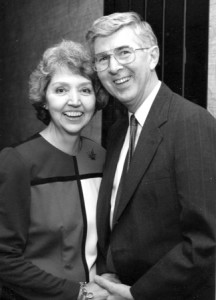The greatest love of all: Canton resident Barbara Wymer remembers her husband, William
By Jeffrey PicketteMarried for more than 47 years, Canton resident Barbara Wymer spent the last 33 years of her husband’s life as more than just his companion. When a brain aneurism left him unable to really communicate with others, she was his voice when he could no longer speak.
William Wymer, an accomplished dentist, passed away this January at the age of 77. He was a dentist with the Air Force and served as the dentist for Presidents Nixon and Ford, as well as key cabinet members like Henry Kissinger and Donald Rumsfeld. When American prisoners of war returned home from Vietnam, Wymer gave them dental care.
In 1976 he was reassigned to a base in Germany and went overseas with his wife and two children, Kimberly and Greg. Barbara Wymer said her husband never wanted to stop being a dentist, but an unforeseen fall from a tree in 1977, a year after their arrival in Germany, permanently altered his and his family’s life and effectively ended his career in the profession he loved.
Wymer was pruning trees in his backyard when he had a brain aneurysm and fell from the tree as a result, breaking his left leg. But the repercussions of the fall were far more severe for Wymer, who was only 44 at the time.
As a result of the aneurysm, Wymer developed aphasia, “an acquired communication disorder that impairs a person’s ability to process language,” according to the National Aphasia Association. While aphasia does not affect intelligence, he never regained the ability to converse; he could only string together a couple of words here or there. He also lost the use of his right side and had to use a four-pronged cane to get around.
“One day [our children] had a father that was the one they had known all of their life. I had a husband — the man that I married —and in less than 24 hours, every single part of our lives changed,” Wymer said.
But Wymer said her husband did not dwell on his condition, but rather was determined to make the most of the situation.
“He always appeared to be happy; he almost always had a smile,” Wymer recalled. “I think it was a huge tribute to him that he dealt with this and accepted it and really didn’t become an angry person.”
He was in rehabilitation for the next 13 months after the aneurism. Wymer sent her children — Kimberly was in seventh grade and Greg was in fifth grade at the time — to live in Canton with her brother and sister-in-law, Link and Carol Munson. William and Barbara rejoined their children toward the end of the rehab stint, when Wymer was receiving care at the VA hospital in Jamaica Plain.
“Bill didn’t have a choice in this, so we just tried to do what was best for our whole family,” Wymer said.
Wymer suddenly found herself as the head of the household and wanted to bring a family who had been separated back together again.
“There were compromises,” she recalled. “There were times when it wasn’t always as much fun as it should have been and [there were] some times when the word ‘fun,’ was not a word we used at all.”
Wymer said attempting to decipher what her husband was trying to express could be like playing a game of “Twenty Questions.” “Part of what made [communicating] easier was because I was his wife and knew him, I pretty much could tell what it was that he was talking about,” Wymer said.
She was in essence his round-the-clock caretaker, a role she was able to accept because she said she loved him.
“If I had been the person who had fallen out of the tree, Bill would have been there for me,” Wymer said.
Prior to the aneurism, he loved to travel. “When we first married, we didn’t spend a penny on anything but travel,” Wymer said. “We went everywhere and did everything.”
But even with a debilitating condition, Wymer said her husband “was determined to do as much as he could,” including traveling. The last major trip the two took was to an event celebrating the 50th anniversary of his class’s graduation from the Ohio State University College of Dentistry.
He walked Kimberly down the aisle at her wedding and was able to share a traditional father-daughter dance with her. He was a member of the Blue Hill Masonic Lodge and he and Barbara helped to establish the Aphasia Community Resource Center.
The Resource Center, now in a partnership with the Boston University Sargent College of Health and Rehabilitation Sciences, celebrates its 20th anniversary this month.
“It was important to help the families and the person with aphasia,” Wymer said. “Each of them have a whole different set of things that are going on for them that they don’t understand, that they don’t know about, and it’s very frustrating to not have a place to go and ask questions.”
Wymer said her husband’s death came as a “complete surprise.” He came down with pneumonia and died 23 days later. He also leaves behind two grandchildren, in addition to his wife and two children.
“The most important thing is Billy had a good life. It wasn’t what we thought; we had no practice for this kind of situation. You just hope when it happens you can deal with it as best you can and I think we did,” Wymer said. “I’m not complaining, and nor did he.”
Short URL: https://www.thecantoncitizen.com/?p=1784











